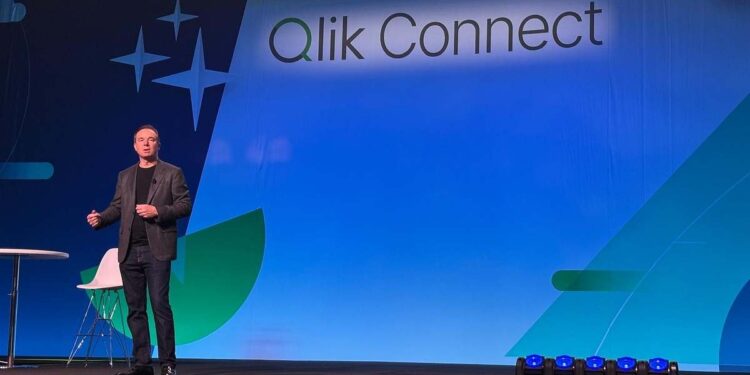During the last few years, companies have followed the mantra that data was the new gold in this era of digitalization. For that reason, they have been storing and accumulating all kinds of information, often without knowing exactly why. This is indicated by various reports from consulting firms and analysis companies. Now, it seems that the time has come to take advantage of all that material. To reach that goal, we are learning about tools that aim to simplify that strategy. This is the main conclusion of Qlik Connect, the annual event just held by this company specialized in data integration, analytics, and artificial intelligence (AI).
Qlik has presented at this conference – which eleconomista.es had the opportunity to attend as the only Spanish media outlet – new tools aimed precisely at facilitating the transition from ‘data-driven’ companies to ‘AI-driven’ companies. The goal is to turn complex data environments into practical information for making better decisions. However, they also warn that “if the information or data we have accumulated and that we dump into that system is garbage, the answers we get afterwards will also be garbage.” This is explained to us by Jamie Kiser, Chief Operating Officer of Talend at Qlik. Precisely, their division, Talend (acquired by Qlik in 2023), offers a set of tools to collect raw data from multiple sources and homogenize them easily.
Fixing the data
Therefore, it is advisable to start from the beginning and, as Qlik’s CEO, Mike Capone, tells us, “it is important to get to work because everyone is working on AI strategies, but first, you have to polish those databases. The big language models (LLMs) will evolve and there will be more of them, but no one is going to fix your data for you. You have to do it yourself,” he warns.
The more than 40,000 customers already using Qlik’s tools – the most significant in Spain being Caixabank – will be able to apply AI uses more easily with Qlik Talend Cloud and Qlik Answers. The first one is characterized by integrating data in an agile way and in private environments. Because this is another key point: moving towards the privatization of AI so that the natural language models we are teaching cannot, in case, benefit the competition… The engineers of this platform have also ensured that Qlik Talend is compatible and communicates seamlessly with other cloud tools (Qlik Cloud) and data analytics tools (Qlik Analytics) from the same company.
The other tool to benefit from the advantages of AI is Qlik Answers, framed in what we know as generative AI. As we had the opportunity to verify with several examples, in this case, once the system has access to all the company’s information, we can ask questions about orders that were canceled. Based on the analysis of that information, it can provide us with reports and conclusions, even improvement recommendations, about why those sales losses occurred. In this way, if it concludes that those frustrated sales occurred due to problems in shipments or delivery delays, it will also identify the most problematic routes, the transport companies that usually fail the most… And from there, we can take the measures we consider necessary.
As a backdrop to the increasing implementation of AI in companies, we have the regulatory issue and the need for transparency in data usage. To address this, Qlik has created an ethical council that will advise companies on the deployment of their solutions, also taking into account the regulations of each country. Remember that at the moment, 120 governments around the world already have some type of legislation in this regard.
A global regulation
We asked Mike Capone, CEO of Qlik, about the possible need to converge on a single global regulation. “What I like to see right now, which I think is great, is how governments and companies from different countries are collaborating on how we can all do this together in the right way. That is what will drive success in this market. We are not seeing the government trying to stop everything and the private sector ignoring the government, but they have to be together and that is precisely what we are seeing.”
Qlik has taken advantage of this annual convention to announce a new alliance with Amazon Web Services (AWS) – which remains the world’s largest cloud – to accelerate the adoption of AI in companies. Although Qlik has its own cloud services, with this agreement, they want more companies to be able to “capitalize on their databases.” In the words of Chris Grusz, General Director of Technology Alliances at AWS, “this collaboration with Qlik will help our customers leverage advanced analytics and cloud computing more effectively, especially when deploying generative AI.” “Our combined efforts will focus on simplifying how companies integrate and leverage AI to achieve measurable benefits,” he added.
In another chapter, that of sustainability, Qlik has expanded its collaboration with the United Nations Framework Convention on Climate Change (UNFCCC) so that this UN agency can use its solutions for free to mitigate the effects of global warming. This action adds to the alliance already in place with the NGO C40 Cities, which has been using these tools to unify the data from more than 90 associated cities, including Madrid and Barcelona. From there, it is possible to establish recommendations, detect improvement trends, perform preventive analysis, or generate synergies between cities with similar issues.


